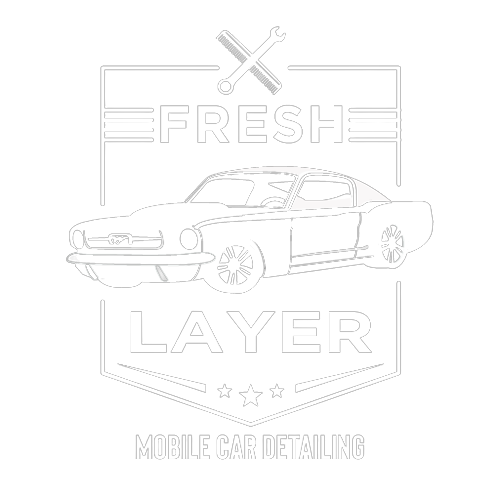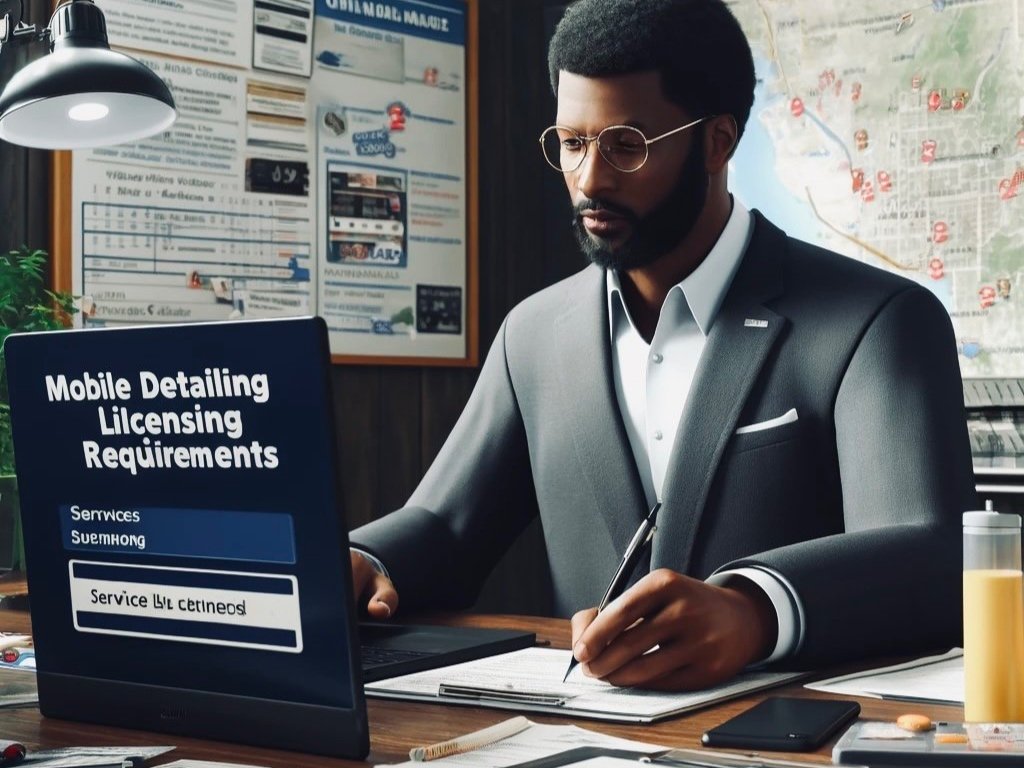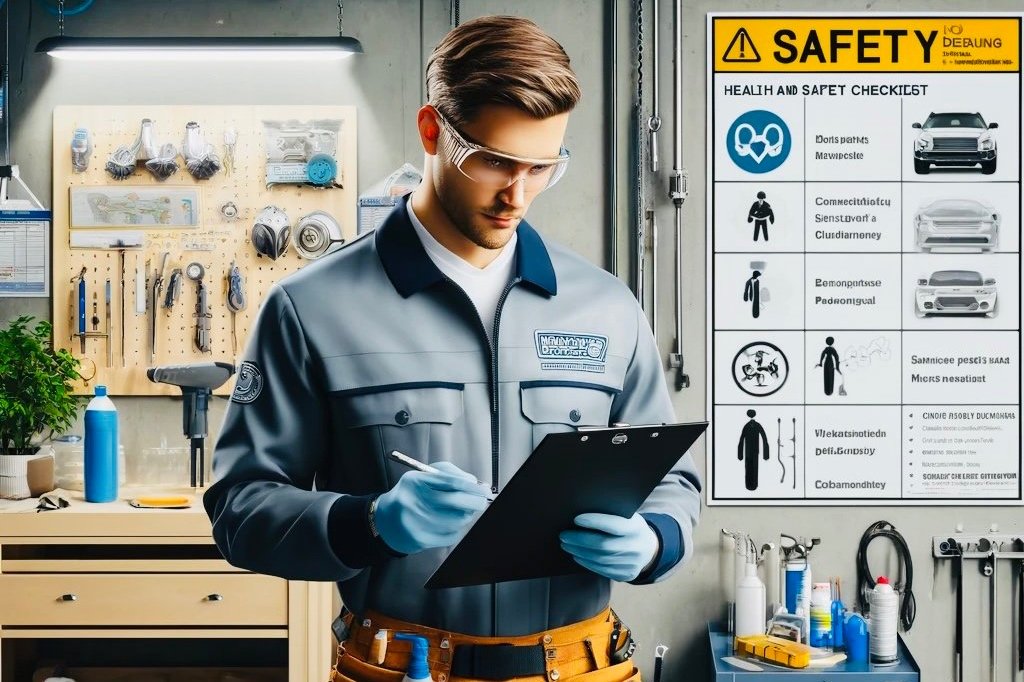Introduction to Starting a Mobile Detailing Business
At Fresh Layer Mobile Detailing, we understand the excitement and challenges of launching a new business.
A mobile detailing business, while promising rewarding returns and flexible work conditions, requires careful planning and adherence to legal standards.
This is why a solid business plan and proper licensing are indispensable components of your setup process.
Importance of a Solid Business Plan
Why a Business Plan Is Essential for a Mobile Detailing Business
A well-crafted business plan serves as the foundation of your mobile detailing business. It helps you:
Clarify Objectives: Define your mission, goals, and strategies.
Attract Investors: Secure funding by presenting a solid plan to potential investors or lenders.
Organize Operations: Establish processes for day-to-day operations.
Mitigate Risks: Identify potential challenges and create solutions.
Did You Know?
According to the U.S. Small Business Administration, businesses with a formal business plan are 30% more likely to succeed than those without one.
In the following sections, we will dive deeper into the components of a business plan tailored for a mobile detailing business, discuss the specific licenses required, and outline the steps to ensure you meet all legal obligations.
Our goal is to equip you with the knowledge and tools to lay a strong foundation for your detailing business, ensuring long-term growth and stability.
Crafting Your Mobile Detailing Business Plan
A well-crafted business plan is a cornerstone of any successful enterprise, and a mobile detailing business is no exception.
It serves not only as a strategic blueprint but also as a tool for communication with potential investors and financial institutions.
Below, we delve into how a business plan can propel your detailing venture forward and detail the essential components that should be included.
Purpose of a Business Plan
A business plan is vital for both operational guidance and securing financial backing. It helps you:
Secure Funding: Lenders and investors often require a detailed business plan before they commit funding to new ventures.
Guide Operations: A business plan provides you with a detailed roadmap, including milestones and strategies, to help manage and grow your business effectively.
our business plan should include the following sections:
1. Executive Summary
What to Include:
A concise overview of your business idea.
Your mission and vision statements.
Key services offered, such as interior detailing, exterior washes, and ceramic coatings.
2. Market Analysis
Why It’s Important:
Understand your target audience and competition to position your business effectively.
What to Include:
Target Market: Define your ideal customers, such as busy professionals or luxury car owners.
Market Trends: Highlight the growing demand for eco-friendly and mobile services.
Competitive Analysis: Identify local competitors and their strengths and weaknesses.
Pro Tip: Use tools like Google Trends or IBISWorld to gather market data.
3. Services and Pricing
What to Include:
A detailed list of services, such as full detailing packages, paint correction, and headlight restoration.
Competitive pricing strategies based on market research.
4. Marketing and Sales Strategy
Why It’s Important:
Outline how you’ll attract and retain customers.
What to Include:
Online Presence: Build a professional website and leverage social media.
Local Advertising: Use Google Ads and community sponsorships.
Customer Retention: Offer loyalty programs and referral incentives.
5. Financial Projections
What to Include:
Start-up costs, including equipment, licensing, and marketing expenses.
Monthly revenue and profit projections for the first year.
Example Start-Up Costs for Mobile Detailing Business:
Mobile Unit Setup: $5,000–$10,000
Equipment and Supplies: $2,000–$5,000
Licensing and Permits: $500–$2,000
By covering each of these components in your business plan, you'll not only provide a comprehensive guide for running your mobile detailing business but also demonstrate your preparedness and business acumen to potential investors and financial partners.
This thorough approach increases your chances of obtaining the necessary funding and achieving long-term success in the competitive detailing industry.
Licensing and Permits for Mobile Detailing Business
Navigating the licensing requirements is a critical step in setting up your mobile detailing business. It ensures that your operation complies with local regulations, which vary by location and can have significant implications for your business's legality and reputation.
This section will guide you through understanding and obtaining the necessary licenses and permits, complying with environmental regulations, and securing appropriate insurance.
Understanding Local Regulations
Research and Compliance: Begin by researching local business regulations that apply specifically to mobile detailing operations. This includes zoning laws, which may affect where you can operate your business and where you can park your mobile detailing vehicle.
Adherence: Ensure that your business adheres to all local, state, and federal regulations. This might involve regular consultations with legal advisors to stay updated on any changes in the law that could affect your business operations.
Necessary Business Licenses and Permits
Types of Licenses Required: Typically, you will need a general business license to operate. Depending on your location and the nature of your services, you may also require specific permits such as a vendor permit, a sales tax permit, or a home-based business permit if you are managing the business from your home.
Steps to Apply:
Contact Local Authorities: Visit your city or county's official website or office to inquire about the specific licenses and permits required for mobile detailing.
Prepare Documentation: Gather necessary documents, which may include identification, proof of business address, and a detailed description of your business operations.
Submit Application: Complete and submit your applications along with any required fees. It's important to do this well in advance of your planned start date as processing times can vary.
Inspections and Approvals: Some permits might require an inspection of your equipment or vehicle before approval. Be prepared for this step if applicable.
Environmental Regulations and Compliance
Chemical Use and Disposal: Understand and follow local environmental laws concerning the use and disposal of chemicals. Since detailing involves chemicals that can harm the environment, you may need to implement specific waste disposal systems to handle runoff and prevent contamination.
Water Usage: In many areas, there are regulations governing water use, especially if you are operating in regions with water shortages. You may need to use water reclamation systems or eco-friendly products to comply with these regulations.
Insurance Needs
Liability Insurance: Protects you from claims that could arise from damages or injuries that occur as a result of your business activities. For example, if a customer's vehicle is damaged during cleaning, liability insurance would cover the costs.
Vehicle Insurance: Since your business is mobile, commercial vehicle insurance is necessary to cover any incidents that occur on the road.
Workers’ Compensation: If you plan to employ others, most states will require you to carry workers' compensation insurance to cover any workplace injuries.
Preparing for Legal Considerations
For anyone starting a mobile detailing business, navigating the legal landscape is crucial.
This section discusses the various legal structures you can choose for your business, the importance of having the right contracts and legal documents in place, and ensuring compliance with health and safety regulations.
Legal Structure of Your Business
Options for Forming a Legal Entity:
Sole Proprietorship: This is the simplest form of business entity, with one owner who pays personal income tax on profits earned from the business. It's easy to set up and requires less paperwork.
Pros: Simple setup, full control of the business.
Cons: Personal liability for business debts and obligations.
Limited Liability Company (LLC): An LLC provides limited liability protection to its owners, who are typically not personally responsible for business debts and liabilities.
Pros: Limited liability protection, tax flexibility.
Cons: More complex and costly to establish than a sole proprietorship.
Partnership: This structure involves two or more people who agree to share the profits or losses of a business.
Pros: Shared resources and knowledge, simple to establish.
Cons: Joint liability for the actions of other partners.
How to Register: The process involves registering with your state’s Secretary of State office, obtaining an Employer Identification Number (EIN) from the IRS, and fulfilling any local licensing requirements.
Contracts and Legal Documents
Essential Contracts:
Service Agreements: Clearly outline the services you will provide, pricing, payment terms, and what is expected from both parties. This helps prevent misunderstandings and legal disputes.
Employee Contracts: If hiring employees, detailed job descriptions, expectations, compensation details, and terms of employment should be clearly stated.
Non-Disclosure Agreements (NDAs): Useful if your business model or services include proprietary processes or products.
Importance of Legal Documents: Having well-drafted contracts and legal documents protects your business by defining the scope of work, ensuring compliance with the law, and safeguarding your rights and assets.
Health and Safety Compliance
Ensuring Compliance with OSHA and Other Regulations:
Mobile Operations Specifics: Mobile detailing businesses must comply with Occupational Safety and Health Administration (OSHA) guidelines which might include proper chemical storage, ensuring safety equipment is used, and training employees on safety protocols.
Regular Audits: Conduct regular audits to ensure that operations remain compliant with health and safety standards. This includes checking on the proper handling and storage of chemicals, maintaining equipment to prevent accidents, and ensuring that all safety measures are up-to-date.
Employee Training: All employees should receive training on health and safety practices related to detailing work. This includes handling chemicals safely, using machinery properly, and what to do in case of an emergency.
Frequently Asked Questions
Q: How much does it cost to start a mobile detailing business?
A: Start-up costs range from $10,000 to $20,000, depending on equipment, vehicle setup, and licensing fees.
Q: How long does it take to get a business license?
A: Processing times vary but typically range from 1–4 weeks.
Q: Is insurance mandatory for mobile detailing businesses?
A: While not legally required in all states, insurance is highly recommended to protect your business.
Q: Can I run a mobile detailing business from home?
A: Yes, but check local zoning laws and obtain the necessary permits.
Q: What’s the best way to attract customers?
A: Focus on local SEO, social media marketing, and building partnerships with other businesses.
Conclusion and Next Steps
Launching a mobile detailing business is an exciting endeavor that can lead to rewarding outcomes both personally and financially.
However, the success of your business largely depends on the foundational steps you take before opening your doors to customers.
A meticulously crafted business plan and adherence to all necessary licensing and legal requirements are not just formalities—they are essential components that safeguard and structure your business for long-term success.
Recap of Key Points
Business Plan: Your business plan is your blueprint for success. It helps you navigate through the complex landscape of business operations, marketing, and financial management. It is also crucial for securing funding, as it demonstrates to potential investors or lenders the viability and potential profitability of your business.
Licensing and Legal Compliance: Securing the correct licenses and ensuring compliance with all legal and environmental regulations not only keeps your business operations lawful but also builds credibility with your clients. Moreover, understanding the appropriate legal structure for your business protects personal assets and defines the responsibilities of any partnerships or collaborations.
Next Step
To ensure a smooth start and to position your business for success, we encourage you to take the following steps:
Utilize Resources: Take advantage of business plan templates that can guide you in detailing every aspect of your business. These templates can be found online or through local business development centers.
Seek Professional Advice: Consult with business advisors or legal experts who can provide personalized guidance tailored to the specifics of a mobile detailing business. This investment can prevent costly mistakes and help streamline your business setup.
Attend Workshops: Participate in workshops and seminars focused on starting small businesses or specifically on mobile detailing. These workshops are invaluable for networking, learning from experienced entrepreneurs, and gaining insights into industry specifics.
Taking these steps will not only prepare you better but also instill confidence in your journey as you navigate the complexities of starting your own mobile detailing business. Remember, the thoroughness of your preparation will reflect in the success of your business. Start planning today to pave the way to a thriving future in the mobile detailing industry.









